Mary Anne Yarde's Blog: The Coffee Pot Book Club , page 182
March 20, 2018
Life in the Time of Van Diemen’s Land by Johanna Craven #History #Australia @JohannaCraven
Life in the Time of Van Diemen’s Land by Johanna Craven
It’s 1820 and London’s east end is dirty, overcrowded and crawling with disease. Neither you nor your family have eaten in days. Desperate, you make your way to Leadenhall Market and stuff a loaf of bread beneath your coat. You think no one has seen you. But you are wrong.
Your punishment for this petty crime? Seven years’ transportation to the penal colony of Van Diemen’s Land, Australia; a place too remote, too distant to comprehend.
For six months you sit below deck of the convict ship, chained to the sorry souls beside you. You dream of the family you left behind in England. A family you’ll likely never see again. Once a week you are brought above for exercise. There is nothing to see but ocean.
When at last the ship arrives in Hobart Town you are assigned as a worker to a wealthy free settler. But you were not made for a life of servitude. You break your overseer’s jaw with the shovel he gave you to dig up his vegetables.
Soon you are back at sea. Chained again and shivering in shirtsleeves as the ship plunges and water seeps into the lightless hold.
You land in a place unlike anything you have ever seen. The sea is wild, the bush impenetrable. Purple mountains disappear into the mist. The men and women around you are wild and angry, the guards unforgiving. This, you learn, is to be your new home. Your task? Take to the monstrous pine trees with an axe and haul the wood back to the settlement. No horses here, you learn. No oxen. All the work to be done by men.
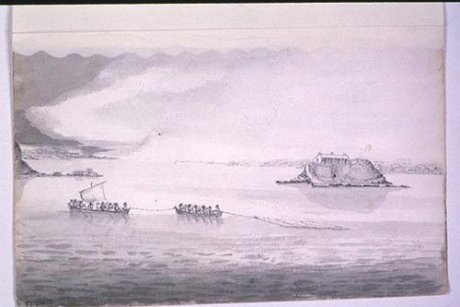 Sketch of Macquarie Harbour by Thomas Lempriere 1830, Utas.edu.au
Sketch of Macquarie Harbour by Thomas Lempriere 1830, Utas.edu.auThis desolate place is Sarah Island Penitentiary at Macquarie Harbour on the rugged west coast of Van Diemen’s Land (present-day Tasmania). A place of secondary punishment, it was the most feared of all Australia’s penal settlements. “You must find work and labour,” the Lieutenant-Governor wrote to the settlement’s commandant, “even if it consists of opening cavities and filling them up again … Prisoners on trial declared they would rather suffer death than be sent back to Macquarie Harbour.” The fate of these men? You’ll find that out in my latest novel; Forgotten Places; a work of fiction interwoven with these true events. Suffice to say, the story of these eight bolters remains one of the most horrific in Australia’s history.
Johanna Craven
 Johanna Craven is an historical fiction writer, pianist and film composer. After living in Melbourne and Los Angeles, she now divides her time between London and the Australian bush. She loves ghost-hunting, cooking (and eating) and plays the Celtic fiddle very badly.
Johanna Craven is an historical fiction writer, pianist and film composer. After living in Melbourne and Los Angeles, she now divides her time between London and the Australian bush. She loves ghost-hunting, cooking (and eating) and plays the Celtic fiddle very badly. Johanna released her first novel Music From Standing Waves in 2015 before signing with Endeavour Media for her second novel The Devil and the Deep Blue Sea.
Forgotten Places
Van Diemen's Land, Australia. 1833.
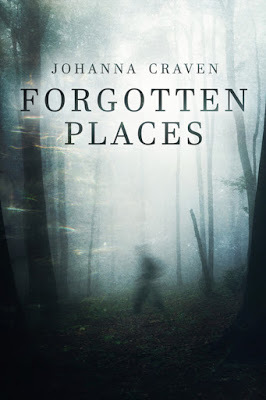 English settler Grace Ashwell flees an abusive lover in Hobart Town, with six-year-old Violet in tow. In her head, escape is easy: find work in the northern settlements and earn enough for passage home to London. But the terrain beyond the settled districts is wilder than Grace could ever have imagined. She and Violet find themselves lost in a beautiful but deadly land where rain thunders down mountains, the earth drops away without warning and night brings impenetrable darkness.
English settler Grace Ashwell flees an abusive lover in Hobart Town, with six-year-old Violet in tow. In her head, escape is easy: find work in the northern settlements and earn enough for passage home to London. But the terrain beyond the settled districts is wilder than Grace could ever have imagined. She and Violet find themselves lost in a beautiful but deadly land where rain thunders down mountains, the earth drops away without warning and night brings impenetrable darkness. Deep in the wilderness, they find a crude hut inhabited by Alexander Dalton, an escaped convict long presumed dead. Hiding from civilisation in an attempt to forget his horrifying past, Alexander struggles to let Grace into his world.
When Violet disappears, Grace's fragile trust in Alexander is put to the test. And while she searches for answers, he will do anything to keep his secrets inside.
Inspired by the true story of the Macquarie Harbour bolters; one of the most horrifying events from Colonial Australia's bloody history.
AmazonAudibleiTunes
Published on March 20, 2018 00:00
March 19, 2018
The miraculous story of Edmund the Martyr by Mary Anne Yarde #Folklore #Myths #Vikings
The miraculous story of Edmund the Martyr by Mary Anne Yarde
AD 869

The Good Lord did not protect the monasteries as those who carried the banner of the raven plundered them. These men, these monsters, murdered, pillaged, and burnt their way across the kingdom. All that stood in the way of the Vikings and the destruction of East Anglia was one brave follower of Christ ~ Edmund, son of Æthelweard, and the rightful King of East Anglia.
While others whispered their fear that the end was nigh and that God had abandoned them, Edmund stood strong. He was confident in his faith and in God. He could not — he would not — contemplate what others did. God was with them, he was sure of it. God would not abandon them in this, their most desperate hour of need. These monsters, these pagans, would not stand up against Christ and the true religion.
The November air was bitter, and above the battleground, the ravens flew. Edmund, despite his conviction and faith, found himself at the mercy of the Viking aggressors. The Viking warlord was a feared man who went by the name of Ivarr inn beinlausi, son of the late Ragnar Lodbrok. Ivarr did not know what to make of this East Anglian King. Edmund was brave, of that, there was no doubt, and Ivarr respected bravery, but at the same time, he also liked to tease.
“You were an honourable opponent, and because of that, I have a mind to set you free,” Ivarr stated. “But first, you must denounce your God. He did not come to your aid when you needed him and I have seen no sign of him while I have been in this kingdom. He has abandoned you. As you can see, our gods are real and powerful. More powerful than the Christian one you follow. I think your God is afraid of ours. Fall on your knees, renounce your faith in Jesus Christ, and I will let you go.”
“You have taken my kingdom,” Edmund stated. “But you will not take away my God.”
“Brave words, from a brave man. King Edmund, you have lost everything. But you do not need to lose your life. Renounce your God, and I will spare you.”
“I would rather die,” Edmund returned.
“Pity,” Ivarr shrugged. “But if that is your wish... Take him away and hand him over to the archers. By the time they have finished with you, King Edmund, you will be praying to our Gods for mercy.”
Ivarr watched with a frown as Edmund was dragged roughly away. His men tormented the former King. They mocked him, beat him and tore at his clothes. Edmund said nothing. He accepted his fate as bravely as Jesus did.
They tied Edmund to an ancient oak, and the archers strung their longbows.
“This can all stop,” Ivarr taunted. “Renounce your God, King Edmund. Renounce him now. If you do not, I will tell my archers to let loose with their arrows.”
The ropes cut into Edmund’s body, and he was afraid, but he raised his head, looked at Ivarr and said, “Forgive them. For they know not what they do.”
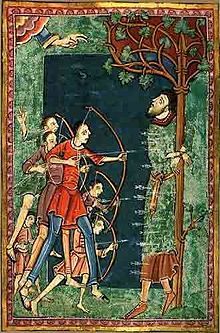 A medieval illumination depicting the death of Edmund the Martyr on 20 November 869 by the Vikings.
A medieval illumination depicting the death of Edmund the Martyr on 20 November 869 by the Vikings.Ivarr snorted in amusement and turned away. The archers’ let loose their arrows. Edmund screamed, while the men around him laughed.
“Cut his head off when he is dead,” Ivarr instructed. He went back to his tent and did not once look back. Tomorrow was another day and there were more treasures to be found and more kingdoms to conquer.
The Vikings left a trail of destruction for Edmund’s loyal warriors to follow. They found their King’s headless body tied to a tree with arrows protruding from it. They cut him down and began to search the clearing for their King’s head.
In desperation they began to comb the nearest woods.
“Where are you, great King?” Edmund’s most trusted warrior asked under his breath.
“Here.” Edmund’s voice called back. “Here. Here.”
Edmund’s warriors ran with new hope to where the voice came from. They skidded to a stop when they reached a small clearing. There, bathed in warm winter sunlight, stood a wolf. And between the wolf's paws lay the head of their King.

The warriors unsheathed their sword but much to their surprise the wolf bowed her noble head and backed away. A page cautiously walked towards the severed head. The wolf watched him for a moment, and then she turned and fled back into the wood.
They buried Edmund on a cold winters morning, and as they lowered the coffin, a wolf howled.
Upon exhumation of the body, many years later, a miracle had occurred. All the wounds, made by the arrows, on Edmund’s corpse had closed up, as if they were never there. But more surprisingly, Edmund’s head was reattached to his body, with a just thin silver scar around his neck.
 Edmund being crowned by angels, from a 13th-century manuscript.
Edmund being crowned by angels, from a 13th-century manuscript.Mary Anne Yarde
 Mary Anne Yarde is the multi award-winning author of the International Bestselling Series — The Du Lac Chronicles. Set a generation after the fall of King Arthur, The Du Lac Chronicles takes you on a journey through Dark Age Briton and Brittany, where you will meet new friends and terrifying foes. Based on legends and historical fact, The Du Lac Chronicles is a series not to be missed.
Mary Anne Yarde is the multi award-winning author of the International Bestselling Series — The Du Lac Chronicles. Set a generation after the fall of King Arthur, The Du Lac Chronicles takes you on a journey through Dark Age Briton and Brittany, where you will meet new friends and terrifying foes. Based on legends and historical fact, The Du Lac Chronicles is a series not to be missed.Born in Bath, England, Mary Anne Yarde grew up in the southwest of England, surrounded and influenced by centuries of history and mythology. Glastonbury — the fabled Isle of Avalon — was a mere fifteen-minute drive from her home, and tales of King Arthur and his knights were part of her childhood.
Mary Anne loves to hear from readers. You can contact her by email: author@maryanneyarde.com
If you would prefer to chat on social media, then you can find Mary Anne on Twitter and Facebook.
War is coming...
Read the multi award-winning series for FREE with Kindle Unlimited
The Du Lac Chronicles: Book #1 is only 0.99 on Kindle for a Limited Time!
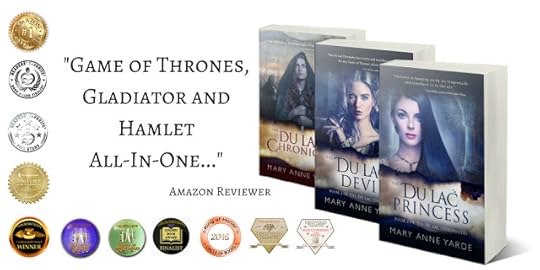
Amazon US Amazon UK
Published on March 19, 2018 00:00
March 17, 2018
#BookReview ~ The Laird of Blackloch: Book 2 in the Highland Rogue Series by Amy Rose Bennett #HistFic #Romance #Scotland #Culloden @AmyRoseBennett
The Laird of Blackloch:Book 2 in the Highland Rogue Series

Following the Battle of Culloden, Alexander MacIvor returns to his ancestral home, Blackloch Castle, only to find the Earl of Tay, chief of the rival Clan Campbell, has laid waste to everything he holds dear. In the face of such devastation, Alex seems doomed to live the life of a fugitive Jacobite ... until a stroke of good luck allows him to escape the Highlands and begin again.
Years later, styling himself as a wealthy Englishman, Alexander reclaims his forfeited estate, becoming the new Laird of Blackloch. But it’s not nearly enough to quench his thirst for vengeance. Hell-bent on destroying Lord Tay, he single-mindedly sets about driving his nemesis to bankruptcy. When he learns the earl intends to marry the very beautiful English heiress, Miss Sarah Lambert, thus escaping penury, he devises a devious plan: kidnap Miss Lambert and ransom her to hasten Tay’s ruin.
When Sarah Lambert learns Lord Tay is not the man she thought he was during a masquerade ball in Edinburgh, she is devastated. Reeling from her discovery, things go from bad to worse when a mysterious yet charming guest by the name of Alexander Black turns out to be a true devil in disguise. Abducted and whisked way into the wild Highlands by Black, Sarah is imprisoned in a remote, island-bound tower. Refusing to be a pawn in Black’s diabolical plan for revenge, she determines that somehow, some way, she will regain her freedom. If only she could unlock Black’s secrets ...
Living in such close quarters, Alexander quickly discovers the spirited Sarah is more than a match for him, and even the best laid plans can go awry when passion flares and the spark of love threatens to revive his long-dead heart. When the shadows of the past begin to gather, will Alexander and Sarah find their way forward ... or will the threatening darkness destroy them both?
The Coffee Pot Book Club Review

Culloden was just the beginning...
Alexander MacIvor has lost everything. The war. His ancestral home. His title. His family. And if he is not careful... His life. On the run from the English, this embittered Jacobite can do nothing but head for the Highlands.
Just when Alexander thought his life could not get any worse, an unexpected moment of good fortune falls onto his lap and paves the way for his escape from the hangman's noose or worse. But as he says goodbye to his beloved Scotland, he vows to one-day return, reclaim what is his and destroy the man who had so nearly destroyed him — the dishonourable and dangerous, Lord Tay. Alexander will stop at nothing to achieve his aims.
Many years later, rich beyond imagination, Alexander returns to his beloved country. He goes by the name of Alexander Black — for Alexander MacIvor is still considered a traitor to the crown. Alexander has bided his time, but enough is enough. He must have his revenge, and if that means abducting the soon-to-be-wife of his greatest enemy then so be it. But Sarah Lambert makes for no easy captive, and he cannot help but admire her. What he must not do is fall in love with the spirited young woman. If she were to find out who he really was, it would spell disaster for his plans and for his life. He must have revenge. Nothing, not even Sarah, would stand in his way.
You know you have read a great book when you sit up to the small wee hours turning those pages because you cannot possibly put the book down and go to bed. The Laird of Blackloch: Book 2 in the Highland Rogue Series By Amy Rose Bennett is such a book.
I have to admit I am a big fan of Amy Rose Bennet. Her books always have a wonderful sense of adventure as well as a compelling and believable romance. I am glad to say that The Laird of Blackloch did not disappoint. Once again, Ms Bennett threw me straight into the story and very soon I came to care about both Alexander and Sarah. Although Alexander's plan for revenge leaves something to be desired, his motives are kind of noble in a twisted sort of way. By abducting Sarah, Alexander is actually saving her from a lifetime of misery to a man who is nothing short of a monster. And although Alexander's actions at kidnapping the young woman can also be seen as monstrous, Alexander has a kind and caring heart. He is quite a contradiction!
Sarah was simply wonderful. She was probably the worst kind of person to abduct because she does not come quietly and she certainly gives Alexander a merry chase on more than one occasion. She is very strong-willed but also incredibly likable. She is one of those heroines that you cannot help but admire. Both protagonists are well drawn, and their story and subsequent romance is very real in the telling.
Lord Tay, the malicious villain to this tale, has to have a mention. He is suitable evil and it a very desperate and conniving character. His only thoughts are for the money that Sarah would bring to a marriage and in fact that is his first thought when he finds out she has been taken. It is her money he loves, not her. Lord Tay is totally lacking in morals and is a thoroughly detestable man.
The Laird of Blackloch is Book 2 in the Highland Rogue Series and it is certainly my favourite so far. Book 3 cannot come fast enough!!
I Highly Recommend.
Amazon iBooks Kobo Barnes & Noble
Amy Rose Bennett
 Amy Rose Bennett has always wanted to be a writer for as long as she can remember. An avid reader with a particular love for historical romance, it seemed only natural to write stories in her favorite genre. She has a passion for creating emotion-packed—and sometimes a little racy—stories set in the Georgian and Regency periods. Of course, her strong-willed heroines and rakish heroes always find their happily ever after.
Amy Rose Bennett has always wanted to be a writer for as long as she can remember. An avid reader with a particular love for historical romance, it seemed only natural to write stories in her favorite genre. She has a passion for creating emotion-packed—and sometimes a little racy—stories set in the Georgian and Regency periods. Of course, her strong-willed heroines and rakish heroes always find their happily ever after.
Amy is happily married to her own Alpha male hero, has two beautiful daughters, and a rather loopy Rhodesian Ridgeback. She has been a speech pathologist for many years but is currently devoting her time to her one other true calling—writing romance.
Amy loves to hear from readers, you can find her: Website and Blog Facebook Twitter Pinterest

Following the Battle of Culloden, Alexander MacIvor returns to his ancestral home, Blackloch Castle, only to find the Earl of Tay, chief of the rival Clan Campbell, has laid waste to everything he holds dear. In the face of such devastation, Alex seems doomed to live the life of a fugitive Jacobite ... until a stroke of good luck allows him to escape the Highlands and begin again.
Years later, styling himself as a wealthy Englishman, Alexander reclaims his forfeited estate, becoming the new Laird of Blackloch. But it’s not nearly enough to quench his thirst for vengeance. Hell-bent on destroying Lord Tay, he single-mindedly sets about driving his nemesis to bankruptcy. When he learns the earl intends to marry the very beautiful English heiress, Miss Sarah Lambert, thus escaping penury, he devises a devious plan: kidnap Miss Lambert and ransom her to hasten Tay’s ruin.
When Sarah Lambert learns Lord Tay is not the man she thought he was during a masquerade ball in Edinburgh, she is devastated. Reeling from her discovery, things go from bad to worse when a mysterious yet charming guest by the name of Alexander Black turns out to be a true devil in disguise. Abducted and whisked way into the wild Highlands by Black, Sarah is imprisoned in a remote, island-bound tower. Refusing to be a pawn in Black’s diabolical plan for revenge, she determines that somehow, some way, she will regain her freedom. If only she could unlock Black’s secrets ...
Living in such close quarters, Alexander quickly discovers the spirited Sarah is more than a match for him, and even the best laid plans can go awry when passion flares and the spark of love threatens to revive his long-dead heart. When the shadows of the past begin to gather, will Alexander and Sarah find their way forward ... or will the threatening darkness destroy them both?
The Coffee Pot Book Club Review

Culloden was just the beginning...
Alexander MacIvor has lost everything. The war. His ancestral home. His title. His family. And if he is not careful... His life. On the run from the English, this embittered Jacobite can do nothing but head for the Highlands.
Just when Alexander thought his life could not get any worse, an unexpected moment of good fortune falls onto his lap and paves the way for his escape from the hangman's noose or worse. But as he says goodbye to his beloved Scotland, he vows to one-day return, reclaim what is his and destroy the man who had so nearly destroyed him — the dishonourable and dangerous, Lord Tay. Alexander will stop at nothing to achieve his aims.
Many years later, rich beyond imagination, Alexander returns to his beloved country. He goes by the name of Alexander Black — for Alexander MacIvor is still considered a traitor to the crown. Alexander has bided his time, but enough is enough. He must have his revenge, and if that means abducting the soon-to-be-wife of his greatest enemy then so be it. But Sarah Lambert makes for no easy captive, and he cannot help but admire her. What he must not do is fall in love with the spirited young woman. If she were to find out who he really was, it would spell disaster for his plans and for his life. He must have revenge. Nothing, not even Sarah, would stand in his way.
You know you have read a great book when you sit up to the small wee hours turning those pages because you cannot possibly put the book down and go to bed. The Laird of Blackloch: Book 2 in the Highland Rogue Series By Amy Rose Bennett is such a book.
I have to admit I am a big fan of Amy Rose Bennet. Her books always have a wonderful sense of adventure as well as a compelling and believable romance. I am glad to say that The Laird of Blackloch did not disappoint. Once again, Ms Bennett threw me straight into the story and very soon I came to care about both Alexander and Sarah. Although Alexander's plan for revenge leaves something to be desired, his motives are kind of noble in a twisted sort of way. By abducting Sarah, Alexander is actually saving her from a lifetime of misery to a man who is nothing short of a monster. And although Alexander's actions at kidnapping the young woman can also be seen as monstrous, Alexander has a kind and caring heart. He is quite a contradiction!
Sarah was simply wonderful. She was probably the worst kind of person to abduct because she does not come quietly and she certainly gives Alexander a merry chase on more than one occasion. She is very strong-willed but also incredibly likable. She is one of those heroines that you cannot help but admire. Both protagonists are well drawn, and their story and subsequent romance is very real in the telling.
Lord Tay, the malicious villain to this tale, has to have a mention. He is suitable evil and it a very desperate and conniving character. His only thoughts are for the money that Sarah would bring to a marriage and in fact that is his first thought when he finds out she has been taken. It is her money he loves, not her. Lord Tay is totally lacking in morals and is a thoroughly detestable man.
The Laird of Blackloch is Book 2 in the Highland Rogue Series and it is certainly my favourite so far. Book 3 cannot come fast enough!!
I Highly Recommend.
Amazon iBooks Kobo Barnes & Noble
Amy Rose Bennett
 Amy Rose Bennett has always wanted to be a writer for as long as she can remember. An avid reader with a particular love for historical romance, it seemed only natural to write stories in her favorite genre. She has a passion for creating emotion-packed—and sometimes a little racy—stories set in the Georgian and Regency periods. Of course, her strong-willed heroines and rakish heroes always find their happily ever after.
Amy Rose Bennett has always wanted to be a writer for as long as she can remember. An avid reader with a particular love for historical romance, it seemed only natural to write stories in her favorite genre. She has a passion for creating emotion-packed—and sometimes a little racy—stories set in the Georgian and Regency periods. Of course, her strong-willed heroines and rakish heroes always find their happily ever after.Amy is happily married to her own Alpha male hero, has two beautiful daughters, and a rather loopy Rhodesian Ridgeback. She has been a speech pathologist for many years but is currently devoting her time to her one other true calling—writing romance.
Amy loves to hear from readers, you can find her: Website and Blog Facebook Twitter Pinterest
Published on March 17, 2018 07:39
#BookReview ~ Kin of Cain: A Short Bernicia Tale by Matthew Harffy DarkAges #HistoricalFiction #Thriller @MatthewHarffy
Kin of Cain: A Short Bernicia Taleby Matthew Harffy
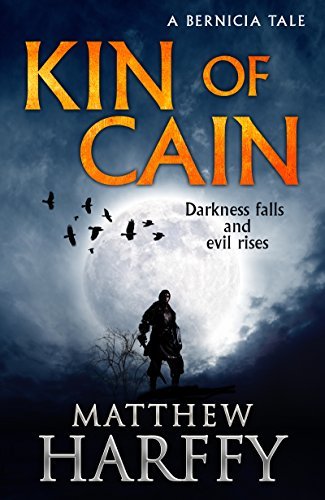
AD 630. Anglo-Saxon Britain. A gripping, action-packed historical tale set in the world of The Bernicia Chronicles. Perfect for fans of Bernard Cornwell.
Winter grips the land in its icy fist. Terror stalks the hills, moors and marshes of Bernicia. Livestock and men have been found ripped asunder, their bones gnawed, flesh gorged upon. People cower in their halls in fear of the monster that prowls the night.
King Edwin sends his champions, Bassus, Octa and band of trusted thegns, to hunt down the beast and to rid his people of this evil.Bassus leads the warriors into the chill wastes of the northern winter, and they soon question whether they are the hunters or the prey. Death follows them as they head deeper into the ice-rimed marshes, and there is ever only one ending for the mission: a welter of blood that will sow the seeds of a tale that will echo down through the ages.
The Coffee Pot Book Club Review

Cain, that murderous creature, was banished by God for killing his brother. He has been silent for a long time. But now the monster stirs once more and takes up arms to continue his savage war.
A blood-curdling cry in the darkest of nights. Lifestock slaughtered. Good men dead. This cannot continue. King Edwin will not allow such a monster to remain at large. He must be hunted. He must be killed.
On a cold winters day, King Edwin's favoured thanes set out on a quest to find and kill the beast that has brought such terror to their King's beautiful kingdom. But this will be an adventure like none before it. And all their lives will be changed forever...
As poetic and as exciting as the Old English epic poems of times gone by, Kin of Cain: A Short Bernicia Tale by Matthew Harffy really appealed to me. The story is an action-packed adventure where new horrors (both real and imagined) lurk around every corner. The characters, particular Octa are fresh and vibrant — very real in the telling. Octa was a perfect protagonist. He is strong but weak. Brave but fearful. Very human. I thought he was wonderfully portrayed.
For those of you who love the old epic poems, this story will be very familiar to you. I am not going to give away any spoilers, but very early on in the story, I cottoned on to what Ms Harffy was writing about. I have to admit, the story he depicted is one of my favourites!!
Mr Harffy has written a fresh take on a very old story. It was a very satisfying retelling with a few little twists of his own.
I thoroughly enjoyed Kin of Cain: A Short Bernicia Tale and I shall look forward to reading more books in the Benicia Tale saga.
Amazon UK Amazon US
Matthew Harffy
 Matthew Harffy lived in Northumberland as a child and the area had a great impact on him. The rugged terrain, ruined castles and rocky coastline made it easy to imagine the past. Decades later, a documentary about Northumbria's Golden Age sowed the kernel of an idea for a series of historical fiction novels. The first of them is the action-packed tale of vengeance and coming of age, THE SERPENT SWORD.
Matthew Harffy lived in Northumberland as a child and the area had a great impact on him. The rugged terrain, ruined castles and rocky coastline made it easy to imagine the past. Decades later, a documentary about Northumbria's Golden Age sowed the kernel of an idea for a series of historical fiction novels. The first of them is the action-packed tale of vengeance and coming of age, THE SERPENT SWORD.Matthew has worked in the IT industry, where he spent all day writing and editing, just not the words that most interested him. Prior to that he worked in Spain as an English teacher and translator. Matthew lives in Wiltshire, England, with his wife and their two daughters.
Matthew loves to hear from readers, you can find him: Website Facebook Twitter
Published on March 17, 2018 02:00
#NewRelease ~ The Laird of Blackloch: Book 2 in the Highland Rogue Series by Amy Rose Bennett #HistFic #Romance #Scotland #Culloden @AmyRoseBennett
Today we are celebrating the release of Amy Rose Bennett's new book. Amy is one of my favourite Historical Romance authors. I can't wait to get between the covers of her latest story!
The Laird of Blackloch:Book 2 in the Highland Rogue Series

Following the Battle of Culloden, Alexander MacIvor returns to his ancestral home, Blackloch Castle, only to find the Earl of Tay, chief of the rival Clan Campbell, has laid waste to everything he holds dear. In the face of such devastation, Alex seems doomed to live the life of a fugitive Jacobite ... until a stroke of good luck allows him to escape the Highlands and begin again.
Years later, styling himself as a wealthy Englishman, Alexander reclaims his forfeited estate, becoming the new Laird of Blackloch. But it’s not nearly enough to quench his thirst for vengeance. Hell-bent on destroying Lord Tay, he single-mindedly sets about driving his nemesis to bankruptcy. When he learns the earl intends to marry the very beautiful English heiress, Miss Sarah Lambert, thus escaping penury, he devises a devious plan: kidnap Miss Lambert and ransom her to hasten Tay’s ruin.
When Sarah Lambert learns Lord Tay is not the man she thought he was during a masquerade ball in Edinburgh, she is devastated. Reeling from her discovery, things go from bad to worse when a mysterious yet charming guest by the name of Alexander Black turns out to be a true devil in disguise. Abducted and whisked way into the wild Highlands by Black, Sarah is imprisoned in a remote, island-bound tower. Refusing to be a pawn in Black’s diabolical plan for revenge, she determines that somehow, some way, she will regain her freedom. If only she could unlock Black’s secrets ...
Living in such close quarters, Alexander quickly discovers the spirited Sarah is more than a match for him, and even the best laid plans can go awry when passion flares and the spark of love threatens to revive his long-dead heart. When the shadows of the past begin to gather, will Alexander and Sarah find their way forward ... or will the threatening darkness destroy them both?
Amazon iBooks Kobo Barnes & Noble
Amy Rose Bennett
 Amy Rose Bennett has always wanted to be a writer for as long as she can remember. An avid reader with a particular love for historical romance, it seemed only natural to write stories in her favorite genre. She has a passion for creating emotion-packed—and sometimes a little racy—stories set in the Georgian and Regency periods. Of course, her strong-willed heroines and rakish heroes always find their happily ever after.
Amy Rose Bennett has always wanted to be a writer for as long as she can remember. An avid reader with a particular love for historical romance, it seemed only natural to write stories in her favorite genre. She has a passion for creating emotion-packed—and sometimes a little racy—stories set in the Georgian and Regency periods. Of course, her strong-willed heroines and rakish heroes always find their happily ever after.Amy is happily married to her own Alpha male hero, has two beautiful daughters, and a rather loopy Rhodesian Ridgeback. She has been a speech pathologist for many years but is currently devoting her time to her one other true calling—writing romance.
Amy loves to hear from readers, you can find her: Website and Blog Facebook Twitter Pinterest
Published on March 17, 2018 00:00
March 16, 2018
#NewRelease ~ Misfortune of Song, book #5 in The Druid’s Brooch Series by Christy Nicholas, is on pre-order! Reserve your copy now! #HistFic #ASMSG @greendragon9
Misfortune of Song
(The Druid’s Brooch Series #5)
By Christy Nicholas

Even a soldier cannot fight love
In 12th century Ireland, all Maelan wants is to do his duty to his Chief and maintain his family’s good name. However, his granddaughter Orlagh, is hell bent on wreaking havoc, with no care for the consequences
When Orlagh falls in love with an itinerant bard, Maelan must rule with an iron fist to keep her from running away. However, her rebellion against his strictures results in disaster and he almost loses her in the same way he lost his beloved wife.
Maelan must make some difficult decisions and bargains with the Fae to save his granddaughter’s life and future. Can he save her happiness as well?
Book Excerpt
Orlagh held up the blue léine.
Eolande shook her head. “No, too much like the one last night.”
“But it’s a completely different color!”
The slim girl took the léinefrom Orlagh’s grasp. “This one is cut the same way. You want something to show off your figure. You want him to realize you’re a woman, yes? A belt helps, but you need something else. Hmm. What about this one?” Eolande held up an older yellow outfit, one Orlagh had outgrown the winter before.
She held the smaller outfit up to Orlagh, nodding. “Yes, this is perfect.”
“This one’s too small! I’ll be popping out all over!”
“Exactly. Now here, before we go out, you should wear the brat over your shoulders. That will hide the… popping… until he sees you.”
Orlagh glanced at Eolande as the latter fussed over her outfit. Her friend stopped and stared back. “What?”
Orlagh gave her friend a grin and a quick hug. “Nothing. I’m thrilled you’re willing to help.”
“I could do no less, my friend. Now, let’s get you beautiful for your love, aye? How about some tiny flowers in your hair? Something regal to match the gold.”
Bedecked like a sacrificial cow, Orlagh felt ridiculous as they walked out of the royal hillfort. A few admiring glances from young men gave her confidence, though, and she nodded to each with increasing boldness. The last one, Caiside, leaned on his spear and gave a low whistle.
“And where are you two lovely girls off to on this day?”
Orlagh almost answered, but Eolande said, “And what business is it of yours?”
After staring askance at Eolande, Caiside shrugged. “Just trying to be friendly. No need to be testy.” He turned away, looking out toward his patrol area, ignoring them.
When they descended the path, Orlagh asked, “Eolande, why be so rude?”
Her friend glanced at her sideways. “Do you really want your grandfather to know what you’re up to tonight?”
“Oh. I hadn’t thought of that.” Of course, any soldier would report such an excursion to her grandfather. He positively wouldn’t approve of her having a liaison with the bard. He would be so angry if he found out. He would yell and throw things, maybe even get a rare beating.
Available for Pre-order
Tirgearr Publishing
Christy Nicholas
 Christy Nicholas, also known as Green Dragon, is an author, artist and accountant. After she failed to become an airline pilot, she quit her ceaseless pursuit of careers that begin with ‘A’, and decided to concentrate on her writing. Since she has Project Completion Disorder, she is one of the few authors she knows with NO unfinished novels.Christy has her hands in many crafts, including digital art, beaded jewelry, writing, and photography. In real life, she’s a CPA, but having grown up with art all around her (her mother, grandmother and great-grandmother are/were all artists), it sort of infected her, as it were.She wants to expose the incredible beauty in this world, hidden beneath the everyday grime of familiarity and habit, and share it with others. She uses characters out of time and places infused with magic and myth.Combine this love of beauty with a bit of financial sense and you get an art business. She does local art and craft shows, as well as sending her art to various science fiction conventions throughout the country and abroad.
Christy Nicholas, also known as Green Dragon, is an author, artist and accountant. After she failed to become an airline pilot, she quit her ceaseless pursuit of careers that begin with ‘A’, and decided to concentrate on her writing. Since she has Project Completion Disorder, she is one of the few authors she knows with NO unfinished novels.Christy has her hands in many crafts, including digital art, beaded jewelry, writing, and photography. In real life, she’s a CPA, but having grown up with art all around her (her mother, grandmother and great-grandmother are/were all artists), it sort of infected her, as it were.She wants to expose the incredible beauty in this world, hidden beneath the everyday grime of familiarity and habit, and share it with others. She uses characters out of time and places infused with magic and myth.Combine this love of beauty with a bit of financial sense and you get an art business. She does local art and craft shows, as well as sending her art to various science fiction conventions throughout the country and abroad.Christy loves to hear from readers, you can find her: Website Blog Facebook Twitter

Published on March 16, 2018 00:00
March 15, 2018
Life in the time of Elizabeth I by Pamela Hartshorne #History #Tudors @PamHartshorne
Life in the time of Elizabeth I by Pamela Hartshorne
The House in Little Wood Street, 1590
“Come in, come in …. You are welcome indeed to the house at the sign of the three swans in Little Wood Street. We are but a step up from Cheapside, but it has been raining all day and for all you may have ducked under the jetties, you will be wet through. And your shoes … they will be sodden. The mid part of the street is running like a river! I assure you, the servants clean the gutters at the front door and the back to stop them blocking with rubbish, and we keep our paving in good repair also, but not all our neighbours do the same, I fear.
Still, I must not keep you standing at the door, dripping onto the tiles. Let Sarah take your cloak. She will hang it to dry while you warm yourself by the fire. A ship from Hamburg docked last night, and my husband is at his warehouses, but he will be home to dine and I hope that you will eat with us? He will want to meet you. He has travelled much and seen many marvels, and he is interested in always in those who come from places afar. There is some veal pie left over from yesterday, and I have boiled some pigeons in the manner my husband likes, with cinnamon and ginger. We will have a custard, too, and a tart with apples …
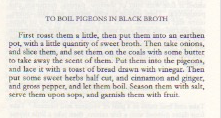 From Thomas Dawson, The Good Housewife’s Jewel, with an introduction by Maggie Black, 2002.
From Thomas Dawson, The Good Housewife’s Jewel, with an introduction by Maggie Black, 2002.You will stay? Good! My husband will be pleased. Do you come up to the parlour, then, until he returns. Sarah, bring wine and cakes! And then you may set the table with a tablecloth and damask napkins, and bowls to wash our hands … and do not forget the pepper box and the salt as you did last night.
Forgive me, Sarah is newly a maid and clumsy still, and I must remind her of everything. She has come to London from the country and misses her mother, I think, but what can she do? She must make her way in the world as we all do.
Ah, I see you are noticing the staircase: it is very fine, is it not? Do you see the carving, how clever it is? I coaxed my husband into having it built. There is not another like it in the street! I like to imagine it when the wood has darkened and the smell of seasoned oak has mellowed and generations have smoothed their hands over the banister, just as I do every time I go up and down the stairs and thank God for my good fortune.
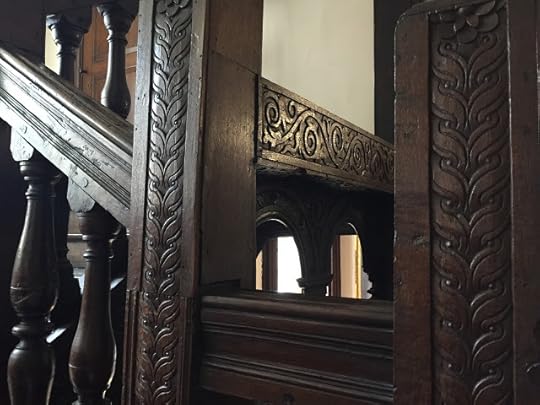 The staircase at Burton Agnes Hall.
The staircase at Burton Agnes Hall.And here is the parlour! It is cosy in here with wainscot on the walls and the painted hangings to make it cheerful. You may sit on a stool and rest your wet feet near the fire while I tidy up the sheets of music that are scattered carelessly on the table. That is supposed to be my daughter, Cecily’s, task. I have told her above a hundred times to keep the chamber neat after we have sung together, but her mind flits like a butterfly. She will make a poor housewife, I fear - not that she worries for that! She thinks it is enough to be fair, to be wealthy, to play the virginals … and, well, we are not as strict with her as we should be, it is true. No matter how my husband and I try to be stern, our daughter has but to smile to make our eyes soften. She brings sunshine into the household on the dreariest of days.
What is that on the cupboard? Why, the usual plate, that I make Sarah polish every day so that it gleams. Oh, this … this is a shell. It was a gift from Jacopo, the servant of a sea captain. He brought it on a day as wet as this. I had never seen anything like it. Is it not strange? It is a fragile thing, curved like a snail’s shell but twenty times the size. Do you see the curious red stripes as it curls in on itself? But that is not the strangest thing about it. Hold it to your ear, as Jacopo told me to do. He says that rushing and roaring that you hear is the sound of the sea that I have never seen.
 A nautilus shell.
A nautilus shell.And this next to it? That is Peg, my wooden baby. I have had her since I was a child. Yes, she has only one arm … ah, that is a long story and a bitter one, how I was cursed and yet I have survived. God has seen fit to break the curse. I am a fortunate woman indeed. I have a wealthy and affectionate husband, a daughter and sons who are dear to me. I am mistress of this fine house. I have a good reputation with neighbours.
And not long since, Cat has returned, who was once as close as a sister to me, who was, I thought, lost to me. A maidservant and yet not one. She is a poor servant, if truth be told. She wrinkles her nose when set to plucking chickens or to filling a scuttle for the midden or sweeping out cobwebs. Her seams are sewn crookedly. She is careless in the kitchen, forgetful in the market. All she wants to do is to sing and make music, as if that were enough to put food on the table and keep the house clean and give us all clean linen to wear.
That is Cat you can hear now in the Great Chamber, playing the lute. Playing that tune that haunts me. Everything I have, I owe to her. She is the only one who knows the truth of me, as I know the truth of her. And now we are trapped together with our secrets and our lies, and I am afraid, so very afraid, that my world is cracking, and it will take but a finger flick to shatter it, and bring it crashing down around me.”
990
The house at the sign of the three swans in Little Wood Street features in The Cursed Wife, published by Pan Macmillan in March 2018.
Pamela Hartshorne
 After a haphazard career working and travelling around the world, Pamela first stumbled into writing as a way to fund a Ph.D. in Medieval Studies at the University of York. Twenty years, 60 romances and one Ph.D. later, she stepped out of her comfort zone and began writing 'time slip' novels that drew on her research into the Elizabethan street and her fascination with the relationship between the past and the present.
After a haphazard career working and travelling around the world, Pamela first stumbled into writing as a way to fund a Ph.D. in Medieval Studies at the University of York. Twenty years, 60 romances and one Ph.D. later, she stepped out of her comfort zone and began writing 'time slip' novels that drew on her research into the Elizabethan street and her fascination with the relationship between the past and the present.Pamela’s latest book, The Cursed Wife, is a psychological thriller set in Elizabethan London.
Pamela lives in York and now writes non-fiction as well as fiction.
More information about Pamela can be found on her: Website Facebook and Twitter.She is always glad to hear from readers and fellow history enthusiasts.
The Cursed Wife
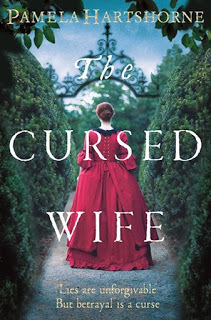 Curses cannot be silenced
Curses cannot be silencedMary lives a contented life as wife to a wealthy merchant in Elizabethan London. But there's a part of her past she can’t forget . . . As a small girl she was cursed for causing the death of a vagrant child, a curse that predicts that she will hang.
Sometimes the happiest households are not what they seem, and Mary's carefully curated world begins to falter. Mary’s whole life is based on a lie. Is she the woman her husband believes her to be?One rainy day she ventures to London's Cheapside, where her past catches up with her . . . Suddenly the lies and deception she has so fought to hide begin to claw to the surface.
The Cursed Wife is a page-turning, psychological thriller set in Elizabethan London.
Amazon Book Depository Waterstones
Published on March 15, 2018 00:00
March 14, 2018
Author’s Inspiration ~ Michelle Saftich #HistFic #WW2 @MichelleSaftich
Please give a warm Coffee Pot welcome to Historical Fiction author, Michelle Saftich. Today, Michelle is going to share with us her inspiration behind her fabulous series…
Port of No Return
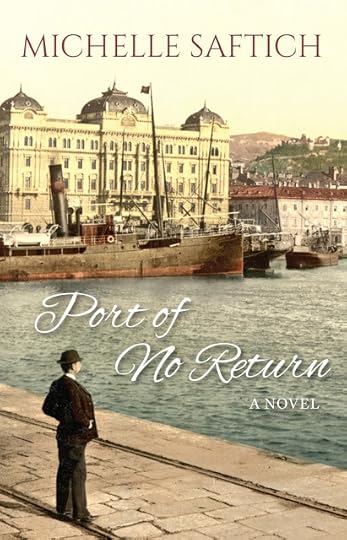
A family is forced to flee their Italian city of Fiume when Tito and his Yugoslav army come for it at the end of World War II. Separated, then homeless and starving in war-torn Europe, they struggle to survive. A story of friendship, family and hope.
Wanderers No More

An Italian family escape Europe, seeking a fresh start in Australia. But they bring the past with them… dreams, love, friends and an enemy. Follow their son Martino as he faces 1950s’ racism and other struggles, in and outside the home, while never giving up on what seems like an impossible dream. (While a sequel, it can be read as a standalone novel).
Author’s Inspiration
Not many people know about the little but devastating conflict that happened at the end of World War II, in the north-east corner of Italy.
While the rest of Europe was preparing for peace at the end of the long, cruel war, north-east Italy was preparing for yet another war, a local one with Yugoslavia. This resulted in a battle that saw thousands killed and then as Tito’s Yugoslav troops moved in, a style of ethnic cleansing began.
Afterwards, even Italy wanted to suppress stories about it, needing to maintain peace with its Communist neighbour, Yugoslavia, throughout the Cold War.
It wouldn’t be until 2004 that the Italian government finally declared a Memorial Day in remembrance of the killings and the displaced Italians.
My grandparents lived in Fiume and my grandfather was named on a Yugoslav Partisan list for execution. They, like thousands of others, had to flee the city.
In researching this history, my father took me to meet an old Italian woman in her suburban home in Brisbane, Australia. In her dimly-lit kitchen, with a cup of tea in front of her, she recounted her memories of Tito’s troops coming down the hills into Fiume to claim their city. She was speaking in Italian while my father translated for me.
Even though I had to wait for the translation, I could tell by her whisperings that she was re-living it, that she was afraid to speak too loud as though Tito’s spies were still around to hear her.
She was only sixteen at the time.
“There were rumours,” she said. ‘We heard them.”
‘What did you hear?” I asked.
She wouldn’t answer. I waited, gave her time. At last, she said… “old mines. They were pushing them alive down old mine shafts.”
She would say no more. My father had told me that when Fiume was taken, the Yugoslav Partisans had “put Italians against the wall and shot them”. I knew executions had taken place, but I didn’t know the full story.
I took to the internet and searched for information. And that’s when I first learned about the “foibe”. Not just old mines, but Italians were taken up into the mountainous karst regions and thrown down natural chasms in the ground. It was chilling.
Now I wanted to write not just about my grandparents’ experience but what had happened around them.
To do this, I shifted from writing a straight family memoir to historical fiction. I was now being inspired by my father’s family and keeping close to their journey but adding fiction to cover and reveal more history.
It was a tough assignment on many levels. But approaching the story through my eyes, the eyes of a granddaughter, with love and sensitivity, I tried to deliver a human tale, a family tale against a harsh historic backdrop, and one that to me should not be forgotten. I had thought to call my book Fiume not Forgotten, but I settled on Port of No Return, a fitting title too, as my grandparents would never return to the beautiful portside town of Fiume, now known as Rijeka.
Wanderers No More is the poignant sequel. In its pages, I tried to explore with open eyes what my father and his family encountered on migrating to Australia; their struggles to adapt and eke out a living while dealing with 1950s’ racism in a much less sophisticated and uncultured country than what they were used to. There is a family tragedy here that was the hardest of all to write…
And yet the novels are essentially about love, hope and inspiration. Times of war, loss and displacement can bring out the worst in people but also the best in people, making them great stories to tell and uphold.
These two novels were a privilege to write.
Links for Purchase
Port Of No Return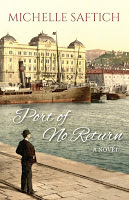 Amazon US Amazon UK
Amazon US Amazon UK
Wanderers No More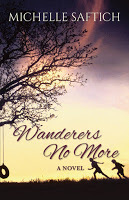 Amazon US Amazon UK
Amazon US Amazon UK
Michelle Saftich
 Michelle Saftich is an author who resides in Brisbane, Australia.
Michelle Saftich is an author who resides in Brisbane, Australia.
She holds a Bachelor of Business/Communications Degree, majoring in journalism, from the Queensland University of Technology (QUT).
She has had a rewarding career, working in communications, including print journalism, sub-editing, communications management, media relations and marketing. However, writing fiction has always been her first passion.
Her debut historical fiction novel, Port of No Return, was published by Odyssey Books in 2015, and its recently published sequel Wanderers No More completes the series. The series was inspired by her Italian-born father and his family and their experiences after World War II.
Michelle is married with two sons and writes with her black cat by her side.
You can find Michelle on…Goodreads WebsiteFacebook Twitter
Port of No Return

A family is forced to flee their Italian city of Fiume when Tito and his Yugoslav army come for it at the end of World War II. Separated, then homeless and starving in war-torn Europe, they struggle to survive. A story of friendship, family and hope.
Wanderers No More

An Italian family escape Europe, seeking a fresh start in Australia. But they bring the past with them… dreams, love, friends and an enemy. Follow their son Martino as he faces 1950s’ racism and other struggles, in and outside the home, while never giving up on what seems like an impossible dream. (While a sequel, it can be read as a standalone novel).
Author’s Inspiration
Not many people know about the little but devastating conflict that happened at the end of World War II, in the north-east corner of Italy.
While the rest of Europe was preparing for peace at the end of the long, cruel war, north-east Italy was preparing for yet another war, a local one with Yugoslavia. This resulted in a battle that saw thousands killed and then as Tito’s Yugoslav troops moved in, a style of ethnic cleansing began.
Afterwards, even Italy wanted to suppress stories about it, needing to maintain peace with its Communist neighbour, Yugoslavia, throughout the Cold War.
It wouldn’t be until 2004 that the Italian government finally declared a Memorial Day in remembrance of the killings and the displaced Italians.
My grandparents lived in Fiume and my grandfather was named on a Yugoslav Partisan list for execution. They, like thousands of others, had to flee the city.
In researching this history, my father took me to meet an old Italian woman in her suburban home in Brisbane, Australia. In her dimly-lit kitchen, with a cup of tea in front of her, she recounted her memories of Tito’s troops coming down the hills into Fiume to claim their city. She was speaking in Italian while my father translated for me.
Even though I had to wait for the translation, I could tell by her whisperings that she was re-living it, that she was afraid to speak too loud as though Tito’s spies were still around to hear her.
She was only sixteen at the time.
“There were rumours,” she said. ‘We heard them.”
‘What did you hear?” I asked.
She wouldn’t answer. I waited, gave her time. At last, she said… “old mines. They were pushing them alive down old mine shafts.”
She would say no more. My father had told me that when Fiume was taken, the Yugoslav Partisans had “put Italians against the wall and shot them”. I knew executions had taken place, but I didn’t know the full story.
I took to the internet and searched for information. And that’s when I first learned about the “foibe”. Not just old mines, but Italians were taken up into the mountainous karst regions and thrown down natural chasms in the ground. It was chilling.
Now I wanted to write not just about my grandparents’ experience but what had happened around them.
To do this, I shifted from writing a straight family memoir to historical fiction. I was now being inspired by my father’s family and keeping close to their journey but adding fiction to cover and reveal more history.
It was a tough assignment on many levels. But approaching the story through my eyes, the eyes of a granddaughter, with love and sensitivity, I tried to deliver a human tale, a family tale against a harsh historic backdrop, and one that to me should not be forgotten. I had thought to call my book Fiume not Forgotten, but I settled on Port of No Return, a fitting title too, as my grandparents would never return to the beautiful portside town of Fiume, now known as Rijeka.
Wanderers No More is the poignant sequel. In its pages, I tried to explore with open eyes what my father and his family encountered on migrating to Australia; their struggles to adapt and eke out a living while dealing with 1950s’ racism in a much less sophisticated and uncultured country than what they were used to. There is a family tragedy here that was the hardest of all to write…
And yet the novels are essentially about love, hope and inspiration. Times of war, loss and displacement can bring out the worst in people but also the best in people, making them great stories to tell and uphold.
These two novels were a privilege to write.
Links for Purchase
Port Of No Return
 Amazon US Amazon UK
Amazon US Amazon UKWanderers No More
 Amazon US Amazon UK
Amazon US Amazon UKMichelle Saftich
 Michelle Saftich is an author who resides in Brisbane, Australia.
Michelle Saftich is an author who resides in Brisbane, Australia.She holds a Bachelor of Business/Communications Degree, majoring in journalism, from the Queensland University of Technology (QUT).
She has had a rewarding career, working in communications, including print journalism, sub-editing, communications management, media relations and marketing. However, writing fiction has always been her first passion.
Her debut historical fiction novel, Port of No Return, was published by Odyssey Books in 2015, and its recently published sequel Wanderers No More completes the series. The series was inspired by her Italian-born father and his family and their experiences after World War II.
Michelle is married with two sons and writes with her black cat by her side.
You can find Michelle on…Goodreads WebsiteFacebook Twitter
Published on March 14, 2018 00:00
March 13, 2018
A Day in the Life of Orlagh ~ 12th Century Irish Seer by Christy Nicholas #History #HistoricalFiction #Ireland @greendragon9
A Day in the Life of Orlagh ~A 12th Century Irish Seer.By Christy Nicholas
My latest historical fantasy novel is set in 12thcentury Ireland amid the toil and strife of the Norman Invasion of Ulster. The book, Misfortune of Vision, is book #4 in The Druid’s Brooch Series, but it works well enough as a stand-alone novel that you don’t need to read the previous novels to follow the narrative.
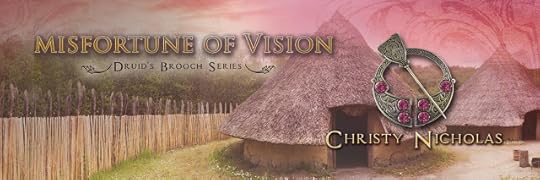
Misfortune of Vision follows Orlagh, a 65-year old Seer to the Chief of the Ulaidh, the Gaelic tribe that rules an area of northeast Ireland. Between an Ostman (Viking) settlement on the coast and an approaching Norman army, as well as a scheming bishop, there is no dearth of excitement in the background. However, Orlagh’s quest is more personal. She needs to find an heir worthy of a family legacy, a magical brooch that has been handed down for centuries. This brooch gives a magical talent to each holder, and each talent is different. For Orlagh, it allows her the gift of prophecy, a mixed blessing to be certain.Ireland at this time was a turbulent place, even without Normans swooping down for a midnight siege. The different Gaelic tribes participated in constant struggles between each other, from simple cattle raids to full on army onslaughts. The territory of the Ulaidh had been nibbled away for years at this point by the Ui Neill tribe, and would eventually have been completely subsumed.While there were no stone castles as we imagine today, wooden palisades around huge hillforts served as the administrative and martial seat of any given clan, or túath. A chieftain’s strength relied on both his warriors and his reputation, and a weak chieftain could easily lose both. Sometimes, if a chief was particularly weak, their derbhfine (those relatives that share a common great-grandfather) would replace the chief with someone more suitable. The chiefdom didn’t necessarily pass from father to son, but from leader to leader among eligible close-kin.
Within the hillforts and across the countryside, round thatched buildings were preferred over the square or rectangular buildings the Ostmen and Normans preferred. The walls were often made with either turf or wattle and daub, woven wicker walls stuffed with mud and hay (among other things) for insulation. Sometimes they were built on a man-made island on a lake with a single causeway for higher defensibility, called a crannog. Some roundhouses were large, two-storied affairs with enough room for a hundred men. Others were intimate, small family quarters. While the trend was shifting in the 12th century, most structures built of stone were the abbeys and monasteries being erected across the land.

The story opens in Dún Dá Lethglas, known today as Downpatrick, in a large hillfort ruled by the chief of the Ulaidh, An Duinn Shleibhe. Orlagh’s own quarters, which served as both home for her and her ward, Clodagh, as well as her apothecary, was near the stables. She preferred the privacy of not being near the main hall, despite the cold and often windy walk to the kitchens. She was snug and happy until her prophecies of an impending attack forced her to travel.
Travel took longer than we are used to, of course. The most common mode was by foot, but if you were wealthy enough, a horse was a boon. It might not actually be any faster in the long run unless you were galloping, but you would be less tired when you arrived!

Orlagh traveled both by foot and by horse at various times, often cursing the fact that traveling in the winter woods, among the ice and slush, was no fit occupation for a grandmother. Still, despite her cursing and occasional dangerous slips, she reached her destinations eventually. Whether it was an ancient stone circle, an Ostman village, or a small fishing village, she arrived safe and mostly sound.
At least, until she encountered an insane Fae lord bent upon a twisted quest of his own…
Christy Nicholas
 Christy Nicholas, also known as Green Dragon, is an author, artist and accountant. After she failed to become an airline pilot, she quit her ceaseless pursuit of careers that begin with ‘A’, and decided to concentrate on her writing. Since she has Project Completion Disorder, she is one of the few authors she knows with NO unfinished novels.Christy has her hands in many crafts, including digital art, beaded jewelry, writing, and photography. In real life, she’s a CPA, but having grown up with art all around her (her mother, grandmother and great-grandmother are/were all artists), it sort of infected her, as it were.She wants to expose the incredible beauty in this world, hidden beneath the everyday grime of familiarity and habit, and share it with others. She uses characters out of time and places infused with magic and myth.Combine this love of beauty with a bit of financial sense and you get an art business. She does local art and craft shows, as well as sending her art to various science fiction conventions throughout the country and abroad.
Christy Nicholas, also known as Green Dragon, is an author, artist and accountant. After she failed to become an airline pilot, she quit her ceaseless pursuit of careers that begin with ‘A’, and decided to concentrate on her writing. Since she has Project Completion Disorder, she is one of the few authors she knows with NO unfinished novels.Christy has her hands in many crafts, including digital art, beaded jewelry, writing, and photography. In real life, she’s a CPA, but having grown up with art all around her (her mother, grandmother and great-grandmother are/were all artists), it sort of infected her, as it were.She wants to expose the incredible beauty in this world, hidden beneath the everyday grime of familiarity and habit, and share it with others. She uses characters out of time and places infused with magic and myth.Combine this love of beauty with a bit of financial sense and you get an art business. She does local art and craft shows, as well as sending her art to various science fiction conventions throughout the country and abroad. Christy loves to hear from readers, you can find her: Website Blog Facebook Twitter
Misfortune of VisionDruid's Brooch Series, #4
Prophecy can be dangerous
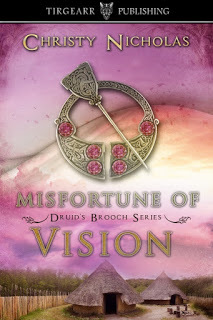 In 12th century Ireland, Orlagh has been Seer to her king for forty years. He doesn’t want to hear her prophecies of war and destruction, and dismisses her efforts to warn him. Therefore, she is determined to fulfill her own quest: to find a worthy heir for her magical brooch.
In 12th century Ireland, Orlagh has been Seer to her king for forty years. He doesn’t want to hear her prophecies of war and destruction, and dismisses her efforts to warn him. Therefore, she is determined to fulfill her own quest: to find a worthy heir for her magical brooch.In the course of events, she must pass judgment on a thief, escape a Norman war camp, and battle wits with a Fae lord. She receives some prophecy of her own and enlists the help of a grizzled old warrior, who happens to be a long–time friend.
You can purchase the series at Tirgearr Publishing
Published on March 13, 2018 00:00
March 12, 2018
Life in Ancient Britannia as Depicted in Apollo’s Raven by Linnea Tanner #History #AncientBritain @linneatanner
Life in Ancient Britannia as Depicted in Apollo’s Raven by Linnea Tanner
History Revisited in Ancient Britain
The historical backdrop of Apollo’s Raven is based on recent archaeological evidence that revisits the accepted history of Ancient Britannia (Britain) prior to the Roman invasion of AD 43. According to archaeological experts, the invasion never happened, at least not in the way it was depicted in the historical records of the Roman Emperor Claudius. He proclaimed his conquest matched the great accomplishments of his forefather, Julius Caesar. Roman forces of 40,000 heavily armored soldiers landed in Kent and trailed a bloody path northward to the Camulodunum (modern day Colchester) where he claimed Britannia for Rome.

Yet recent archaeological fieldwork has uncovered evidence of a significant Roman presence in Britannia well before 43 AD. There was widespread trade between Britannia and Rome after Julius Caesar’s futile incursions into Britannia in 55 and 54 B.C. At the time, Caesar demanded hostages to ensure the British rulers met their treaty agreements. It was also a method in which the young Britons were acculturated to accept the Roman way of thinking more in line with the elites.
Hostages from British royal families were often raised and educated in Roman households. They were not treated as prisoners, but were allowed to move freely in public places with minimal security measures to prevent their escape. When they returned to their homeland as young adults, they could speak and write Latin, and many of them adopted Roman customs.
There may have been a Roman military presence in Britain at least three decades before Claudius. Two British kings from northern Hampshire and Eastern Kent sought refuge in Rome, hoping to persuade the Emperor Augustus to intervene in regaining their kingdoms in 7 AD. It is possible that Augustus sent troops to Britannia, but his goal to conquer the isle may have changed due to the annihilation of three Roman Legions in the forests of Germany in AD 9.
Claudius’s predecessor, the emperor Caligula, also attempted an invasion in AD 39, but his plans ended in fiasco. The Roman historian Dio Cassius writes that Caligula was primarily aggrieved ‘at his lieutenants who won some slight successes’ in the war against Britannia, suggesting Roman troops may have already landed. Modern historians presume Caligula’s men had mutinied and were punished for not carrying out his plans.
Life in Apollo’s Raven
Book 1: Apollo’s Raven is set in 24 AD southeast Britannia (modern day Kent) during the reign of the Roman Emperor Tiberius. There is significant Roman influence over the politics and lifestyle of the ruling tribal kings. Legionary forces have been sent there to settle the political differences between two Celtic kings. One of the kings rules the Cantiaci kingdom (modern day Kent) while the other has sovereignty over the Catuvellauni territory (modern day Colchester). Both rulers were raised and educated as hostages in Roman households.
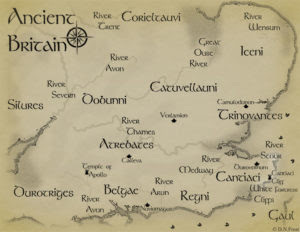
The agricultural area in southeast Britannia is rich in grains and livestock. The rural population live in thatched-roof round houses alongside their plots of land. The ruling class lived in hilltop fortresses whose structures have been influenced by Roman architecture.

The Celtic ruling class consists of noble warriors whose status is often gained through combat with each other at festivities. Although the Celtic society has become more patriarchal, women still have significantly more rights than their Roman counterparts. They can own property and be military commanders, Druids, and rulers. The heroine, Catrin, is based on the recorded historical accounts of fighting Celtic women and warrior queens. The warrior queen, Boudica, united various British tribes and almost expelled Roman occupation in 61 AD.
Vision of Catrin, Celtic Warrior Princess

Fantastical elements inspired by Celtic mythology and legends from Wales and Ireland are interwoven into the historical backdrop of Apollo’s Raven. Magical powers included the abilities to prophesy, to shape-shift, and draw on the forces of nature. Celts believed the soul reincarnated into other forms animal and human forms, consistent with the views of the 500 BC Greek philosopher, Pythagoras. Several Celtic healing sites are named after Apollo, probably as a result of the blending of religious beliefs.
References:
1. John Manley, AD 43 The Roman Invasion of Britain: A reassessment; Tempus Publishing, Inc., Charleston, SC, 2002.2. Graham Webster, Roman Invasion of Britain, Reprinted 1999 by Routledge, London.3. Julius Caesar, translated by F. P. Long, The Conquest of Gaul; United States: Barnes & Noble, Inc., 2005.4. Cassius Dio, Roman History, published in Vol. VII of the Loeb Classical Library, Edition 1924; Book LX
http://penelope.uchicago.edu/Thayer/E/Roman/Texts/Cassius_Dio/60*.html5. Miles Russell, Roman Britain: Ruling Britannia, Published in History Today, Volume 55 Issue 8 August 2005. http://www.historytoday.com/miles-russell/roman-britain-ruling-britannia
Linnea Tanner
 Linnea Tanner weaves Celtic tales of love, magic, adventure, betrayal and intrigue into historical fiction set in Ancient Rome and Britannia. Since childhood, she has passionately read about ancient civilizations and mythology which held women in higher esteem. Of particular interest are the enigmatic Celts who were reputed as fierce warriors and mystical Druids.
Linnea Tanner weaves Celtic tales of love, magic, adventure, betrayal and intrigue into historical fiction set in Ancient Rome and Britannia. Since childhood, she has passionately read about ancient civilizations and mythology which held women in higher esteem. Of particular interest are the enigmatic Celts who were reputed as fierce warriors and mystical Druids.Depending on the time of day and season of the year, you will find her exploring and researching ancient and medieval history, mythology and archaeology to support her writing. As the author of the Apollo’s Raven series, she has extensively researched and traveled to sites described within each book.
A native of Colorado, Linnea attended the University of Colorado and earned both her bachelor’s and master’s degrees in chemistry. She lives in Windsor with her husband and has two children and six grandchildren.
Linnea loves to hear from readers, you can find her: Website Blog Twitter Amazon Author Page Facebook Linked-in Pinterest Google Goodreads
Apollo’s Raven
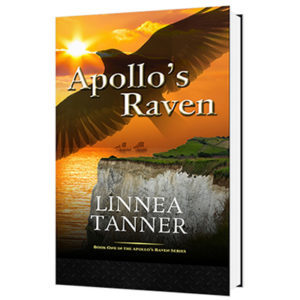 An ancient curse threatens the fates of a Celtic warrior princess and her people in 24 AD Britannia.
An ancient curse threatens the fates of a Celtic warrior princess and her people in 24 AD Britannia.British tribal kings hand-picked by Rome to rule are fighting each other for power. King Amren’s former queen, a powerful Druid, cast a curse at her execution which foretells Blood Wolf and the Raven will rise and destroy him.
King Amren’s daughter, Catrin, is swept into a political web of deception and betrayal when envoys sent by the Roman Emperor Tiberius demand allegiance from their kingdom. King Amren takes Marcellus, the great-grandson of Mark Antony, as hostage and demands Catrin spy on him.
Drawn to the magnetic pull of Marcellus, Catrin discovers she is the Raven and must find a way to block the curse. Torn between her forbidden love for the enemy and loyalty to her people, she urgently calls upon the magic of the Ancient Druids to alter the dark prophecy that awaits her.
Amazon Barnes and Noble IndieBound Bookotopia
Published on March 12, 2018 00:00
The Coffee Pot Book Club
The Coffee Pot Book Club (formally Myths, Legends, Books, and Coffee Pots) was founded in 2015. Our goal was to create a platform that would help Historical Fiction, Historical Romance and Historical
The Coffee Pot Book Club (formally Myths, Legends, Books, and Coffee Pots) was founded in 2015. Our goal was to create a platform that would help Historical Fiction, Historical Romance and Historical Fantasy authors promote their books and find that sometimes elusive audience. The Coffee Pot Book Club soon became the place for readers to meet new authors (both traditionally published and independently) and discover their fabulous books.
...more
...more
- Mary Anne Yarde's profile
- 159 followers



